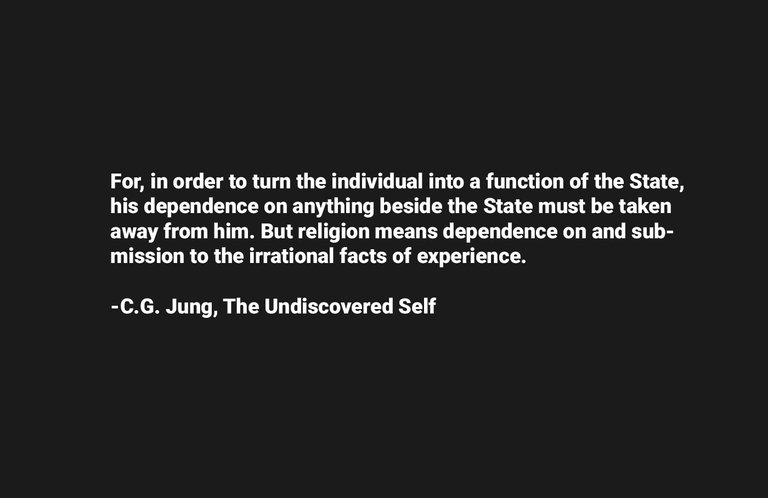“For, in order to turn the individual into a function of the State, his dependence on anything beside the State must be taken away from him. But religion means dependence on and submission to the irrational facts of experience.”
-Carl Jung, The Undiscovered Self
I am once a Christian and a current Atheist. After abandoning the dogma, creeds, and factually flawed claims of Christianity I found myself in a place of weakness. I no longer could trust or find meaning in my own experiences. I stood powerless facing the voice of the empire and the unanimous echoes of its citizens of obedience and mediocrity. My every attribute was dwarfed by the knowledge, intellect, skill, and strength of the State and its institutions. What grounds did I have to stand against them? My only path for making a difference in the world was to submit to the mass mind of a given political group and rally around their leaders and the facts and statistics that come bundled with their packets of hope.
For those who haven’t experienced belief in a religion, it really is a powerful psychic mechanism. It’s possible to believe with all conviction and fortitude in a truth that the “world’s” authorities take strong positions against. This is both extremely dangerous and powerful as it is responsible for the abolishment of slavery, the acts of Gandhi, Mother Teresa, and Dr. Martin Luther King Jr., but also Jihadists, Flat Earthers, The Alt-Right, and Alex Jones. Once you lose “faith” in your convictions, it’s deathly frightening to rely on anything internal to guide your actions.
The individual who is not anchored in God can offer no resistance on his own resources to the physical and moral blandishments of the world. For this he needs the evidence of inner, transcendent experience which alone can protect him from the otherwise inevitable submersion in the mass
-Carl Jung, The Undiscovered Self
Without transcendent experience, we have no ability to judge from a point outside of the system. Just as flying to the moon allowed us to see the earth from above and changed our collective psyche forever, spiritual experiences allow us to rise above our current realm of dominion and find a source of higher calling and conviction which grants us the ability to maintain autonomy, challenge the powers, critique the system, and create new models for human organization. Without this experience, we have no defense against the State’s statistics, proclamations, propaganda, and hubris.
If statistical reality is the only reality, then it is the sole authority. There is then only one condition, and since no contrary condition exists, judgment and decision are not only superfluous but impossible. Then the individual is bound to be a function of statistics and hence a function of the State or whatever the abstract principle of order may be called"
-Carl Jung, The Undiscovered Self
Finding your essence is a long journey filled with fears of insanity, grandiose revelations, and tragedy. It’s a treacherous path that you must navigate successfully or risk falling into insanity, on one end, or the group mind, on the other. I was once incapacitated by statistics and data, but I’m slowly finding my way to a healthy, rich, infinite spirituality. The soil is magic, the earth is conscious, and the universe is connected. We are more than the quantifiable sum of our parts. Science has mastered classical physics and chemistry, but it isn’t sophisticated enough to measure consciousness or even begin to make prescriptions on systems as complex and integrated as life on earth.
“It is not ethical principles, however lofty, or creeds, however orthodox, that lay the foundations for the freedom and autonomy of the individual, but simply the incontrovertible experience of an intensely personal, reciprocal relationship between man and the extramundane authority which acts as a counterpoint to the ‘world’ and its ‘reason.’”
-Carl Jung, The Undiscovered Self

Great idea for a post, and well executed. Thank you!
Good post. Are you familiar with the book series "Ringing Cedars"? You and your beautiful family just make me think about these books.
Thank you for this article and the reflection on Christianity and what is left, once a faith is gone. I have the impression that people often poor out the bay with the bath.
I would say most people DO have strong ethic beliefs depending on the values the Christian doctrines handed over to us. Not only the Western virtues but also the Eastern ones. But they dumped everything in this regard because they miss strong role models in acting out the ethics.
People do underestimate this fact on a grand scale. We all need something to rely on. And this "something" ARE ethics. When I ask someone if he wants to be betrayed, murdered, being talked bad behind his back, everyone can agree that this is not correct ethical behavior. Nevertheless, this counts for others and should be lived out often it doesn't count for the self.
I think one reason is that the individual thinks of himself to have no power or effect in the world. Which is totally wrong. Every single action in the daily life is a chance in checking if I do live up to those well-known ethics.
From my point of view, hopelessness (suffering) leads to extremes. Either one becomes a radical Christian or a radical cynic. Or less extreme a secular being relying only on the sciences (which do not offer anything spiritual on an official level) or on solidarity, which is good but not enough.
Buddhism is so far the best offer. There is no creator of the world and it offers deep and sensible approaches to the philosophical and psychological themes in which one can explore.
I could say a lot more but leave it here.
I am happy to have found you. Thank you!